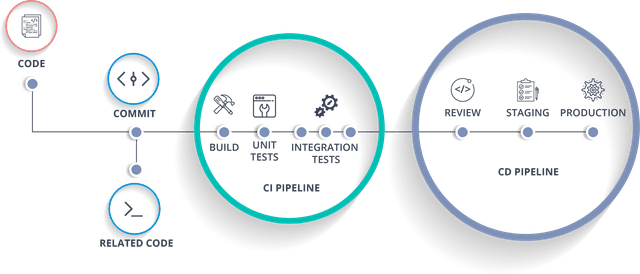16 Automation for Software Development
Continuous Integration (CI) refers to the build and unit testing stages of the software release process. Every committed revision can trigger an automated build and test. With Continuous Delivery (CD), code changes are automatically built, tested, and prepared for a release to production.

16.1 GitHub Actions
GitHub Actions is a Continuous Integration and Continuous Delivery (CI/CD) platform that allows you to automate your build, test, and deployment pipeline. You can create workflows that build and test every pull request to your repository, or deploy merged pull requests to production.
Setting up a demo workflow in GitHub Actions following: https://docs.github.com/en/actions/quickstart.
- GitHub has templates available. Go to the Actions tab in your repository and select new workflow for an overview.
- You can find workflow examples shared in the community.
- Add
workflow_dispatchas a trigger for your GitHub Actions workflow. With this trigger, you can manually run an action, instead of having to rely on external triggers. This is quite useful when testing your workflow. - Test your workflow in a separate branch to avoid committing many small changes during debugging of the workflow.
The TU Delft Gitlab does not (yet) have preconfigured servers available to run Gitlab pipelines, the equivalent of GitHub Actions. In order to set up a pipeline, you will need to request a TU Delft Virtual Private Server and configure a Gitlab runner there. The DCC has developed a step-by-step guide.
16.1.1 Automating testing
A common usecase of automation is to trigger automatic testing when pushing changes and creating pull requests.
Python
The example below is taken from the CodeRefinery lesson on Continuous Integration.
name: Python package testing
on:
push:
branches: [ "main", "develop" ]
pull_request:
branches: [ "main", "develop" ]
workflow_dispatch:
jobs:
test:
permissions:
contents: read
pull-requests: write
runs-on: ubuntu-latest
steps:
- uses: actions/checkout@v4
- name: Set up Python 3.10
uses: actions/setup-python@v5
with:
python-version: "3.10"
- name: Install dependencies
run: |
python -m pip install --upgrade pip
python -m pip install flake8 pytest pytest-cov
if [ -f requirements.txt ]; then pip install -r requirements.txt; fi
- name: Lint with flake8
run: |
# stop the job if there are Python syntax errors or undefined names
flake8 . --count --select=E9,F63,F7,F82 --show-source --statistics
# exit-zero treats all errors as warnings. The GitHub editor is 127 chars wide
flake8 . --count --exit-zero --max-complexity=10 --max-line-length=127 --statistics
- name: Test with pytest and calculate coverage
run: |
pytest --cov-report "xml:coverage.xml" --cov=.
- name: Create Coverage
if: ${{ github.event_name == 'pull_request' }}
uses: orgoro/coverage@v3.1
with:
coverageFile: coverage.xml
token: ${{ secrets.GITHUB_TOKEN }}MATLAB
Matlab has multiple pre-defined GitHub Actions available to use in your workflows: https://github.com/matlab-actions.
name: Generate Test and Coverage Artifacts
on:
push:
branches: [ "main", "develop" ]
pull_request:
branches: [ "main", "develop" ]
workflow_dispatch:
jobs:
test:
name: Run MATLAB Tests
runs-on: ubuntu-latest
steps:
- name: Check out repository
uses: actions/checkout@v4
- name: Set up MATLAB
uses: matlab-actions/setup-matlab@v2
with:
release: R2023b
- name: Run tests
uses: matlab-actions/run-tests@v2
with:
source-folder: src
test-results-junit: test-results/results.xml
code-coverage-cobertura: code-coverage/coverage.xml
- name: Upload coverage reports to Codecov
uses: codecov/codecov-action@v4.0.1
with:
file: code-coverage/coverage.xml
token: ${{ secrets.CODECOV_TOKEN }}This workflow uses Codecov to analyse the coverage report (free service for public repositories).
⮕ Learn more about Codecov
16.1.2 Automating documentation generation
GitHub Pages is a static site hosting service that takes HTML, CSS, and JavaScript files straight from a repository on GitHub, optionally runs the files through a build process, and publishes a website.
In order to deploy the documentation generated by the workflow below, you need to navigate to Setting > Pages in your repository and set:
- Source: “Deploy from a branch”
- Branch:
gh-pagesfromroot
It is a best practice to only deploy new documentation to the gh-pages branch upon a Pull Request to the main branch. This avoids mismatches between the available source code and the documentation.
name: documentation
on: [push, pull_request, workflow_dispatch]
permissions:
contents: write
jobs:
docs:
runs-on: ubuntu-latest
steps:
- uses: actions/checkout@v4
- uses: actions/setup-python@v5
with:
python-version: '3.10'
- name: Install dependencies
run: |
pip install -r docs/requirements.txt
- name: Sphinx build
run: |
sphinx-build docs/ docs/_build/
- name: Deploy to GitHub Pages
uses: peaceiris/actions-gh-pages@v4
if: ${{ github.event_name == 'push' && github.ref == 'refs/heads/main' }}
with:
publish_branch: gh-pages
github_token: ${{ secrets.GITHUB_TOKEN }}
publish_dir: docs/_build/
force_orphan: trueCustomizing the workflow: - Install dependencies: This example assumes you have a separate requirements.txt in the /docs folder. Update the location of the requirements.txt if you store the sphinx dependencies in the root.
- With GitHub Free Plan cannot deploy a Pages from a private repository.
- GitHub Pages sites are publicly available on the internet, even if the repository for the site is private.
16.1.3 Workflows for building Python packages
You can automate the publishing of a new version of your Python package through a GitHub Action. Notice that in the workflow below, the trigger is the creation of a new release on GitHub.
name: Upload Python Package
on:
release:
types: [published]
jobs:
deploy:
runs-on: ubuntu-latest
steps:
- uses: actions/checkout@v4
- name: Set up Python
uses: actions/setup-python@v5
with:
python-version: '3.11'
- name: Install dependencies
run: |
python -m pip install --upgrade pip
pip install build
- name: Build package
run: python -m build
- name: Publish package
uses: pypa/gh-action-pypi-publish@release/v1
with:
password: ${{ secrets.PYPI_API_TOKEN }}This action should of course only be triggered if all other workflows (testing, building) have passed.
16.1.4 Additional concepts
Variables and secrets
Secrets are variables that you create in an organization, repository, or repository environment. The secrets that you create are available to use in GitHub Actions workflows. GitHub Actions can only read a secret if you explicitly include the secret in a workflow.
⮕ More information on Using secrets in Github Actions.
Matrix strategy
A matrix strategy lets you use variables in a single job definition to automatically create multiple job runs that are based on the combinations of the variables. For example, you can use a matrix strategy to test your code in multiple versions of a language or on multiple operating systems.
A job will run for each possible combination of the variables. In the example below, the workflow will run 12 jobs, one for each combination of the os and python-version variables.
jobs:
example_matrix:
strategy:
matrix:
os: [ubuntu-latest, windows-latest, macos-latest]
python-version: ['3.8', '3.9', '3.10', '3.11']
runs-on: ${{ matrix.os }}
steps:
- uses: actions/checkout@v4
- uses: actions/setup-python@v4
with:
python-version: ${{ matrix.python-version }}Artifacts
Artifacts are files or sets of files that are produced during the execution of a workflow and need to be stored or shared between jobs in a workflow.
To upload an artifact, you typically add a step in your workflow:
steps:
- name: Upload build output
uses: actions/upload-artifact@v4
with:
name: build-output
path: <path/to/build/output>Artifacts can be downloaded in subsequent jobs of the same workflow using the actions/download-artifact action. This is done with a step like:
steps:
- name: Download build output
uses: actions/download-artifact@v4
with:
name: build-output
path: <path/to/download>By default, artifacts are retained for 90 days.
16.2 SonarCloud
To automate checking your code quality, we can also make use of a third-party service. SonarCloud is a cloud-based code analysis service designed to detect coding issues in 26 different programming languages. The free plan allows you to analyze an unlimited numbers of public repositories. Private projects will not be importable on this plan.
- Make your repository public.
- Link your GitHub repository to SonarCloud via their login page.
- Follow the instructions to set up the code analysis.
You can also integrate SonarCloud code analysis in GitHub Actions. Typically, you would create a new workflow file, for example .github/workflows/sonarcloud.yml, and configure triggers to your needs. You will need to setup a SonarCloud Token to Github Secrets and configure what needs to be analyzed in sonar-project.properties.
name: SonarCloud Workflow
push:
branches:
- master
- main
pull_request:
types: [opened, synchronize, reopened]
jobs:
sonarcloud:
runs-on: ubuntu-latest
steps:
- uses: actions/checkout@v4
with:
fetch-depth: 0 #Their recommendation - disabling shallow clone is recommended for improving relevancy of reporting.
- name: SonarCloud Scan
uses: sonarsource/sonarcloud-github-action@<action version>
env:
SONAR_TOKEN: ${{ secrets.SONAR_TOKEN }}The basic usage step-by-step is described in their GitHub repository.
